Meet previous Simula Interns
William Ho
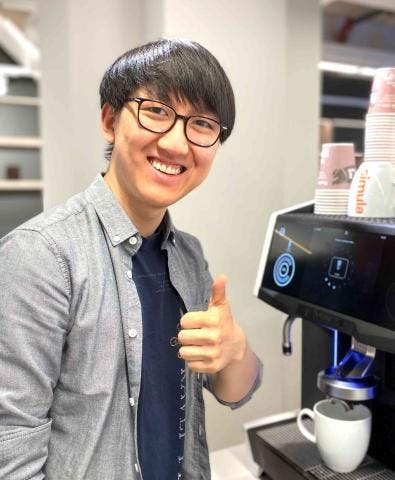
Field of study: Computer Science (1st year master's student) - Columbia University
Project: AI-based testing techniques for generating sythetic healthcare data
Department: Department of Engineering Complex Software Systems (ComplexSE)
1. What are you working on this summer?
I am working on a problem related to Performance Regressions, which is when correctly functioning software becomes slower or consumes more resources than previously and is usually introduced by programmers unintentionally. However, performance regressions are notoriously hard to identify. Therefore, we research new ways to identify potential performance regressions before they are introduced by employing deep learning methods.
2. What made you choose Simula for a summer job?
I was determined to pursue a career within research, since I knew from earlier on that the industry or working for a big consultant firm wasn’t something for me. Simula has the perfect environment with its fundamental and innovative research I want to be a part of. The informal and inclusive research environment Simula has, makes it a perfect place for me to be in as I want to pursue a PhD career in the future.
3. What has been the most surprising or unexpected part of your internship?
My research task was a bit more difficult than I expected. However, my supervisor has been a great support for me so far. He checks in with me every day, is critical to my work, supportive, and allows me to work quite independently, which is great since I like the freedom! Another unexpected part of the internship is the opportunity to meet all the excellent researchers, both in-house and as well as guest lecturers that visit Simula. We get to meet people that we typically won’t have the opportunity to. For instance, we got to meet Senior Computer Scientist Maged Elaasar from CalTech/NASA and one of the world’s most decorated Professors of Software Engineering Lionel C. Briand.
4. What would be your number one tip for next year’s summer interns?
Be curious, engaged, and take all the opportunities you are presented, you will learn so much. Jump into it and be creative! Remember that this is all a learning process, and ask if you have questions! The supervisor is looking for your potential to develop, and not for an all-knowing guru.
5. If you had to be shipwrecked on a deserted island, but all your human needs—such as food and water—were taken care of, what two items would you want to have with you?
Endless with ropes because it is impossible to make in nature, and a knife. The knife is obvious, and rope is surprisingly versatile. With these tools you can for example easily start a fire and easily make a fishing rod.
6. What have you learned so far?
Research can be incredibly frustrating at times, and is an incremental process where new ideas and solutions will arise as you develop a better understanding of the problem at hand, and in the end, when you finally get the “A-ha” moment, all the hard work and frustrations will be worth it. In addition, what may seem easy on the surface will most likely be more challenging than expected, and the same goes for the opposite direction.
Yiyao Chen
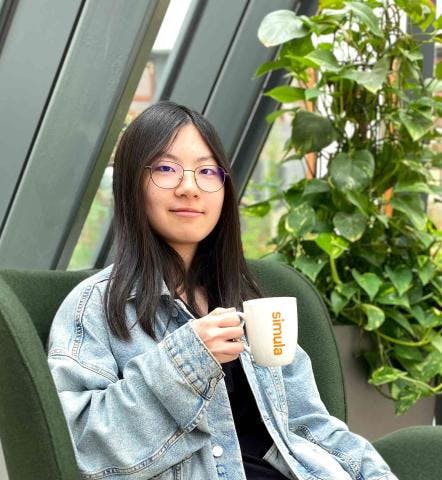
Field of study: Programming and system architecture (3rd year bachelor’s student) University of Oslo
Project: Log parsing and analysis of Chaos Toolkit logs
Department: Data-Driven Software Engineering Department
1. What are you working on this summer?
My project is about log parsing. System logs record system runtime information. They come from logging statements like print, Console.Writeline and we perform log analysis based on logs to understand the behavior of the system. But analyzing unstructured logs is difficult and time consuming. Therefore, we need to do log parsing to transform semi-structured logs into structured messages, so they can be used for further analysis.
2. What made you choose Simula for a summer job?
I was a bachelor student, and were thinking of doing a master’s degree. While searching for master thesis topics, I came across Simula. They have many master theses on their webpage, and I also checked out Simula’s webpage as well. I read on about their summer internship program as it appealed to me and I decided to apply!
3. What has been the most surprising or unexpected part of your internship?
Before I came to Simula, I thought that we were only going to work in the summer internship program. But I was surprised about the many social activities for summer interns! Not only the academic socializing events organized by Simula, but we also had one summer intern social chief that initiated on social happenings just for the summer interns. We have the chance to get to know each other, and I feel we have been taken good care of.
4. What would be your number one tip for next year’s summer interns
Take notes on what you do every day, then you can look back later in the project to see what you have worked on. By doing so, it would give you the chance to look back on the work, and keep track of the project. Another thing is to have clear expectations in what you want to achieve. In that way supervisors can help you achieve the goals you have set.
5. If you had to be shipwrecked on a deserted island, but all your human needs—such as food and water—were taken care of, what two items would you want to have with you?
Tools so I can start fire with and a hammock to sleep in.
6. What have you learned so far?
- Using shell script to edit content of a file.
- Continuous integration using GitHub.
- Process mining using Celonis and Python
- Read and search for papers in an efficient way
Aleksandra Simic
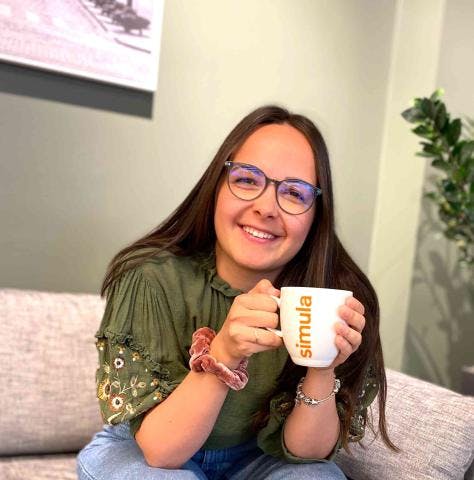
Field of study: M.Sc. Communication Technology (first-year master’s student) Norwegian University of Science and Technology (NTNU)
Project: Assessing traffic scheduling mechanisms in the Linux Kernel for Fronthaul access of virtual base stations in the Cloud-RAN
Department: The Center for Resilient Networks and Applications (CRNA)
1. What are you working on this summer?
My name is Aleksandra, and my project is related to improving the 5G network infrastructure.
Since the first deployment of 5G networks, there is a need to continue improving its Radio Access Network (RAN). And Cloud RAN is introduced so that multiple Base Stations run on the same server as software applications. But those Base Stations are real-time processes that can be affected by other processes running on the same computer. They need to compete with other processes to transmit traffic which can cause unwanted delays. Therefore, we need to implement and test an optimal resource allocation (for ex. CPU) so that we can have deterministic delays and make the best use of resources.
2. What made you choose Simula for a summer job?
Two reasons made me choose Simula’s internship. The first reason is that it is a diverse and international working place, where everyone speaks English. The second reason is that it is a research laboratory. The main activities are education, research and innovation, which are activities I am interested in. Also, my friend did a summer internship with Simula last year and she really recommended it.
3. What has been the most surprising or unexpected part of your internship?
I was positively surprised by the social aspects of the internship. Initially, I thought we were only going to work from 08:00 until 16:00, but I was wrong. We got the chance to get to know other interns and the researchers through social activities. In general, I feel very included and I believe the social aspects are just as important as having a good working environment.
4. What would be your number one tip for next year’s summer interns?
Before the internship: Apply for the internship! Wait for Simula’s summer internship application portal to open! During the internship program: Don’t worry about working on a new task. If you don’t know much about it, you will learn as this is the place for it. I have a great supervisor that is supportive and very reachable. In short, don’t worry too much, you will learn and adapt!
5. If you had to be shipwrecked on a deserted island, but all your human needs—such as food and water—were taken care of, what two items would you want to have with you?
Phone with satellite connection and low power consumption. And, a knife-weapon, maybe a sword?
6. What have you learned so far?
I learned a lot about the project and how to analyze the data. I also improved my coding skills in Python. Also, I got an insight into the research world which I believe is a unique experience.
Jonatan Winsvold
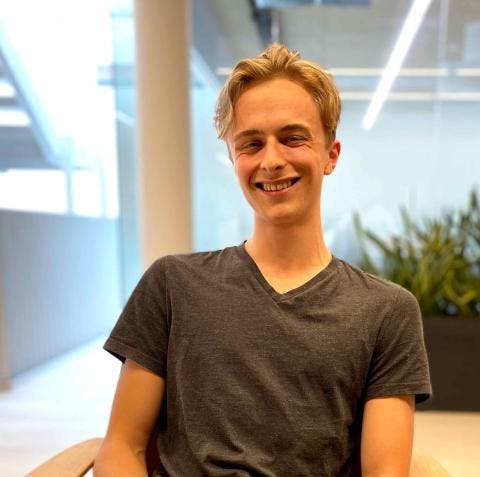
Field of study: Natural Sciences - Mathematics and Information Technology (second year bachelor’s student) - University of Oslo
Project: Benefit Points
Department: Department of IT Management (ITM)
1. What are you working on this summer?
My name is Jonatan and I work on developing a tool for project management that can predict how valuable a new feature will be for the users. When large organizations try to set a scope for their projects, they usually give each feature a predicted cost in the form of a number, but they don’t measure the perceived value of the feature as a number. Since we humans have a tendency to overlook what does not get counted, I want to phrase this value in terms of a number. This number is called Benefit Points. This will enable managers of large projects to prioritize the features that give the most value for the least cost.
2. What made you choose Simula for a summer job?
I had heard from others I have studied with that Simula was a good place to work. In addition, that it is very relevant to my studies and that you learn a lot from the internship.
3. What has been the most surprising or unexpected part of your internship?
I was not prepared that I would have so much freedom at work. My supervisor has given me the opportunity to decide a lot for myself. I have been given a goal which is to implement these benefit points, but it’s up to me to decide what technologies to learn and use.
4. What would be your number one tip for next year’s summer interns?
Have faith in yourself that you will achieve what you are trying for. If you have an idea that you think is good, then bring it up with the supervisor. Creative solutions are often needed. In addition, have faith that you have come far enough in study that you can invent things yourself. Last but not least, do not eat too much for breakfast, save your appetite for lunch which costs 32 kroner!
5. If you had to be shipwrecked on a deserted island, but all your human needs—such as food and water—were taken care of, what two items would you want to have with you?
One is to have a Helicopter to get me home, and another thing is to have a pilot who can use the helicopter.
6. What have you learned so far?
I have learned a lot about implementing software for the work management tool called Jira, as well as back-end development with NoSQL.
Martin Kristiansen
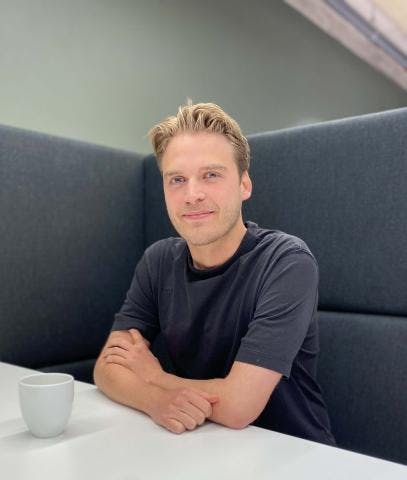
Field of study: Computational Science (second year master’s student) - University of Oslo
Project: MicroJulia
Department: Department of Numerical Analysis and Scientific Computing (SCAN)
1. What are you working on this summer?
In medical research, there is a special interest in understanding how oxygen is distributed in the outer part of the brain and in the microJulia project, we want to study how this distribution is affected by different vascular graphs. One way of studying this is to model the vascular graphs and the surrounding tissue and solve differential equations describing diffusion in the coupled system. But this method can be a tedious exercise, and given the huge diversity of vascular graphs in the brain, there is a demand for a quicker route from vascular graph to e.g. oxygen concentration. Therefore, we want to explore the option of using machine learning by training a model on randomly generated vascular graphs and obtaining a neural network that receives a graph as input and estimates the oxygen concentration in the surrounding tissue without solving the differential equations governing the flow. Additionally, and maybe more exciting is that ML allows us to solve the inverse problem where we are given some oxygen concentration and can obtain the needed vascular graphs.
2. What made you choose Simula for a summer job?
As a student at the University of Oslo taking courses in informatics, I’ve met many lecturers also employed by Simula. We have also had presentations by people at Simula on what they are researching and how they employ mathematics and informatics we learn at the university. Because of this, I immediately turned to Simula when I was looking for a summer job. It seemed like a great way to spend the summer and also a great opportunity to see what it is like to be a research scientist. My master thesis is also related to research conducted at Simula, namely scientific machine learning.
3. What has been the most surprising or unexpected part of your internship?
Most surprising is how well Simula has prepared for the summer interns. They have prepared well over a dozen different project for us throughout the summer and are never reluctant to answer our questions. I’ve also gotten a lot of say in how we pursue the research project and what topic to spend more time on. My supervisor has made it clear that it is most important for us to learn and enjoy ourselves, which is a great motivation. Lastly, I have to mention the great office space Simula has at Kristian Augusts gate 23. I was a bit sad when I heard that they have moved from Fornebu, because that is where I live, but after a few trips from our own master’s/intern room to the amazing coffee machine and the incredible lunch served every day in the canteen, I am sure that I can say for all the interns that we could not be happier.
4. What would be your number one tip for next year’s summer interns
There are a lot of great minds at Simula so use the opportunity to study their methods and learn from their expertise.
5. If you had to be shipwrecked on a deserted island, but all your human needs—such as food and water—were taken care of, what two items would you want to have with you?
A. A fire-starter kit, to prepare the food and create some sort of distress signal.
B. A swiss army knife, also to prepare the food and to create other tools.
6. What have I learned so far?
Half way through the internship I have gotten used to programming in Julia, which was completely new for me, I have also started seeing the advantages of using Julia when solving partial differential equations. In addition, I have learned some new PDE theory on how to couple different dimensional domains. This makes up the ground work for computing the training data for the neural network, which is exciting.
Hanne Rokstad
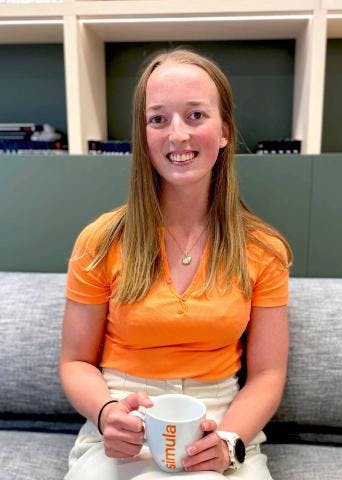
Field of study: Physics and Mathematics (second year integrated master’s student) - NTNU
Project: Image registration
Department: Department of Numerical Analysis and Scientific Computing (SCAN)
1. What are you working on this summer?
My name is Hanne, and I’m studying a master’s degree in Physics and Mathematics at NTNU, and will be starting on my third year. At Simula I’m working in the SCAN department, supervised by Johannes. The project is based on optimization of medical imaging, using FeniCS and Julia. By using different methods, one can take for example two MRI pictures and compare the two images to find the deformation. And there have been implementations of this to form an atlas brain, a standard brain, to use in the surgical and treatment planning against brain tumors, gliomas. For those of you that may not know, more than 50% of primary brain tumors are gliomas, which are rarely treatable, and progresses to high-grade tumors leading to death within 6-12 months. But, for this atlas brain to be accurate, we need better methods for image registration. Therefore, we will look at the LDDMM method (large deformation diffeomorphic metric mapping). This method uses constrained optimal control to register multiple shapes in an image. This is what I’ll look into during this internship, by gradually adding different parameters from a simple case of transformation from a circle to a square.
2. What made you choose Simula for a summer job?
The internship in Simula is very relevant to me, as I want to pursue a career within research. Just having the opportunity to be in such a prestige research environment and meet all the researchers here is great! For example, Jupiter Notebook was invented here, how cool isn’t that? I want in bio-physics and medical technology - and this summer job is relevant to the study.
3. What has been the most surprising or unexpected part of your internship?
The most surprising part for me was when I realized that there are so many different things to work with, that you initially thought were the same thing. There are actually niche fields for absolutely everything, and that the different elements that is been working on, ultimately have the same goal.
4. What would be your number one tip for next year’s summer interns?
Be social and try not to over work yourself! Remember that this is a learning curve and everything has a process.
5. If you had to be shipwrecked on a deserted island, but all your human needs—such as food and water—were taken care of, what two items would you want to have with you?
A laptop, so I can work and reach out to people. My second item will be a bicycle, so I can explore the island.
6. What have you learned so far?
The project I am working on this summer is based on very theoretical mathematics, so I have learned a lot about this. My supervisor emphasizes a lot on how to improve methods by focusing on the mathematics behind it, and shows how mathematics is very relevant in the field I want to work on in the future.
In addition, I have learned a bit about what it is like to work with research. This involves a lot of tries and fails, and can at times seem demotivating. But that feeling when you have finally debugged and solved the problem, makes it all worth it.
Sonja Plaku
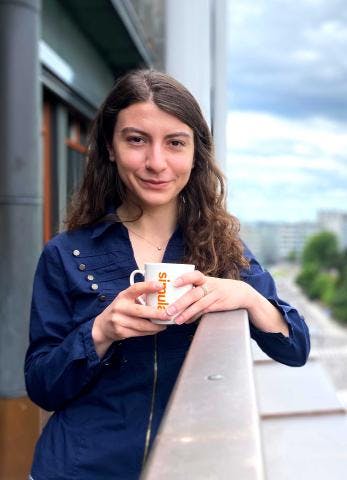
Field of study: M.Sc. Applied Economic (first year master’s student) BI Norwegian Business School
Project: Volatility Models for Energy Markets
Department: Simula@BI
1. What are you working on this summer?
My name is Sonja and this summer I am working with a research project that looks at the possibility of implementing VAR models for energy markets as programs in probabilistic programming languages. Previously used econometric papers specify space-state models for parameter estimation, but deterministic programming languages used there do not allow for proper support for random variables and probability distributions. Therefore, we are currently working with Birch to extend these deterministic languages and carry out inferences.
2. What made you choose Simula for a summer job?
I have always been interested in research. However, reading research papers and looking over other people’s work has been a passive way to show my interest. Simula has given me the opportunity to participate first handedly in a project and be inspired by researchers working here.
3. What has been the most surprising or unexpected part of your internship?
It has been insightful to see the need to break down a research problem into several smaller tasks that require the parallel work of researchers of different backgrounds. This internship has once again proven the benefit of group work and the call for new approaches to old tasks.
4. What would be your number one tip for next year’s summer interns?
To not be afraid to ask questions as all people working with you are willing to help. The motto for this year’s internship has been to not struggle on your own for too long.
5. If you had to be shipwrecked on a deserted island, but all your human needs—such as food and water—were taken care of, what two items would you want to have with you?
A piece of glass to help get a fire started and probably a book to spend my time with until help arrives.
6. What have you learned so far?
I have definitely learned more about my topic of research; probabilistic programming languages, but I have also been able to participate in seminars from PhD students and researchers at Simula working on various other projects.
Sami Laubo
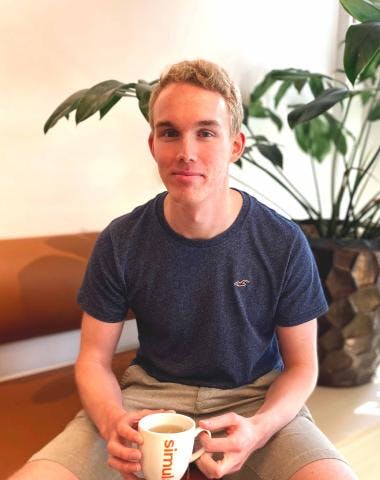
Field of study: Applied Physics and Mathematics (third year master’s student) Norwegian University of Science and Technology (NTNU)
Project: Explore small conductance calcium activated (SK) channel pharmacology in cardiomyocytes and cardiac tissue
Department: Department of Computational Physiology (ComPhy)
1. What are you working on this summer?
My project is about electrical signals in the heart which controls the heartbeat. There are some diseases that can cause disturbances in these signals and the current medicines could definitely be improved. And my project is about one specific type of channel for these electrical signals, which has a large impact on these disturbances. However, it’s hard to get very detailed information about what’s happening from physical experiments and it’s therefore beneficial to create mathematical and numerical models for these channels. These models can then be used to gain new knowledge, test out different drugs and ultimately create more targeted and specific medicines for the diseases.
2. What made you choose Simula for a summer job?
Much of it was a mixture of programming, mathematics and biochemistry. I can use everything I have learned in the study in this job and my interest in programming. I have also heard that Simula is a great workplace and it has a good research environment.
3. What has been the most surprising or unexpected part of your internship?
I got to take part in the research that they actually do - and further develop what my supervisor worked on in her doctorate. I gained insight into their research everyday life, and what exact mathematics and programming they use. Much of what I learned in school was transferable and a lot of what I did in physics at school is programming, and that's a lot of what I do here. I also have a say on forming the project and what I wanted to work on myself, in a way it gave me a lot of freedom.
4. What would be your number one tip for next year’s summer interns?
Don’t be afraid to ask questions. You are often thrown into something that is advanced, and it is difficult for the supervisors to know what you can and cannot do. They are just happy to be asked questions to and to explain things.
5. If you had to be shipwrecked on a deserted island, but all your human needs—such as food and water—were taken care of, what two items would you want to have with you and why?
Knife - useful for everything, and Helium balloon with a very long thread. This is because when I stroll into the forest, rescue can see where I am from the emergency signals I have made on the beach.
6. What have you learned so far?
I’ve learned about the whole process of research and especially how to extract information from experimental data and build mathematical models based on the data. It has also been valuable to actually use the knowledge from my studies in a real research project to troubleshoot and plan the next steps in the process.